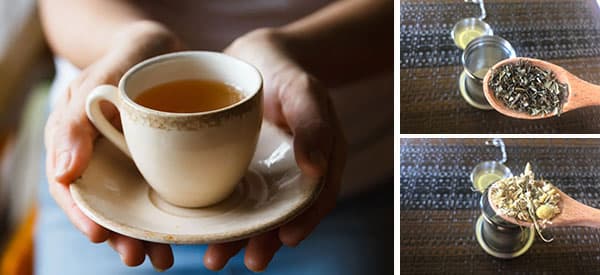
Gut-Healing Herbal Tea
The gut always seems to be at the root of all problems, aggravating one set of symptoms before moving on to another. Likely you’ve heard about how important gut health is and how it connects to so many other areas of the body. So, first, a quick kudos to us for identifying this crucial detail. Now… if only we can figure out how to keep our overworked and overstressed digestive system in check—we’ll have it made.
But a few flavorful and gut-friendly herbs can help with your digestive health across the board, and they work exceptionally well when paired with other herbs of their caliber. And one of the best ways to deliver these potent herbs into your body is by making a gut-healing tea.
Herbs often work in multiple ways on specific body systems like digestion, for example, because symptoms often have a shared root cause.
Reasons for Gut Health Issues
Of course, your digestive wellness habits will depend on your specific body and symptoms. However, many mild herbs can help relieve gut-related symptoms, especially when used synchronically.
One of the things that cause digestive upset that you may have heard about is Leaky Gut Syndrome. A leaky gut means the intestinal lining has become damaged, allowing toxins to enter the bloodstream.
Sometimes underlined diseases are responsible, like IBS (Irritable Bowel Syndrome) and even Irritable Bowel Disease (IBD). Both IBS and IBD diagnoses are growing at an alarming rate and can even exist simultaneously.
Other common reasons people experience digestive problems include:
- Age
- Poor diet choices
 SIBO
SIBO- Food allergies
- Inflammation
- Gut dysbiosis
- Intestinal parasites
- Too many antibiotics
- Metabolic issues
- Hormone imbalance
- Stress
- Prescription drugs
When let go, gut imbalances can have damaging, even long-term consequences. It’s important to address digestive problems fully if you want any real resolution. However, it is preferable to manage symptoms whenever possible, which is exactly what many of these gut-healing herbs can do. Each plays a supportive role to varying degrees; some may even assist in correcting some core issues.
⇒ Ready to heal and fertilize your gut for optimal health? Visit the Apothecary today and learn more about the Balanced Leaky Gut Tincture.
Again, though, herbal helpers are only a piece of the puzzle. Take a quick look at these useful gut-supporting herbs.
Slippery Elm
Slippery elm (Ulmus rubra) becomes gelatinous when mixed with water, coating the digestive tract from the mouth to the colon. Slippery elm is excellent for sore throats, coughs, gastroesophageal reflux, IBS and IBD symptoms, diverticulitis, and diarrhea. It can also help alleviate constipation and gives the tea a silky texture.
Marshmallow Root
Marshmallow (Althaea officinalis) is another mucus-stimulating herb that becomes gelatinous when wet. This herb can help repair the gut lining and discourage leaky gut syndrome. In addition, it can lower inflammation, soothing the entire digestive tract. Marshmallow root also fights bacteria and can be great for mouth sores, ulcers, sore throat, and cough. It helps the body make fluids like mucus and urine which grab hold of toxins and eliminate them through various channels.
Peppermint
Peppermint (Mentha piperita) is anti-inflammatory and antispasmodic. Peppermint is often used in tea to combat nausea, vomiting, and dizziness. This common leaf has strong anti-reflux properties and is nurturing to the liver and bile duct, which stimulate digestion. Peppermint helps move trapped gas through the digestive tract that could be causing bloating, flatulence, and even pain. In addition, it can be very soothing for the intestines… and the mind. So much so that you can use it in the evening to wind down and to help facilitate a restful night’s sleep. Peppermint can also help balance hormones, which play a special role in digestion.
Chamomile
Even though it may not taste bitter, chamomile (Matricaria recutita) is technically a bitter herb that is known to stimulate bile production and assist with digestion. It’s also great for prompting the walls of the intestines to move waste through and can be beneficial for people with slowed digestion. Lastly, chamomile is antibacterial and has been proven effective for colic, indigestion, muscle spasms, tension, inflammation, and infection.
Licorice
Licorice (Glycyrrhiza glabra) is an adaptogenic herb that helps the body adjust to different stressors. Licorice has anti-inflammatory, anti-viral, and antispasmodic properties that can help alleviate muscle cramps and pain. Furthermore, this sweet-tasting herb is helpful for heartburn and indigestion and can help regulate metabolic hormones that fight adrenal exhaustion.
Cinnamon Bark
Research suggests cinnamon can help feed good gut bacteria while eliminating harmful bacteria. It’s also antiparasitic, and antioxidant and can help reduce inflammation and support cellular metabolism. In addition, cinnamon can help maintain the integrity of the stomach walls and also helps reduce gas, bloating, and abdominal discomfort.
Ginger
Ginger (Zingiber officinale) may be best known for its anti-nausea properties, but it’s also a potent anti-inflammatory, antioxidant, and anti-bacterial root. It helps activate digestive enzymes and protects against toxins and pathogens. Ginger can also help relieve gas and bloating, and as a warming spice, ginger helps with circulation and digestive flow too.
Gut-Healing Tea
You will need:
- A tea ball
- A tea (coffee) cup
- 8 ounces of scalding hot water
- ½ teaspoon of dried peppermint leaves
- ½ teaspoon of chamomile flowers
- ¼ teaspoon of marshmallow root
- 1 pinch of slippery elm bark
- ¼ teaspoon of licorice root
- ¼ teaspoon of cinnamon bark (or 1/8 teaspoon ground cinnamon)
- ¼ teaspoon of ginger
- Sweetener to taste (honey, stevia, monk fruit; optional)
Instructions
- Gather your dried herbs, tea ball, and teacup.

- Measure each herb directly into the tea ball one by one.

- Place the tea ball in the cup and cover it with hot water.

- Let it steep for at least seven minutes before adding any sweeteners.

Enjoy!
The true path to restoring the gut lies somewhere in the middle of all the hype and within a combination of things such as gut-healing foods, supplements, and gut-supporting herbs. You can choose to add all kinds of things to your gut healing routine, like taking probiotics and digestive enzymes or eating anti-inflammatory foods.
Homemade Healing Broth from Vegetable Scraps
Eat This to Fertilize Your Gut (Video)

 SIBO
SIBO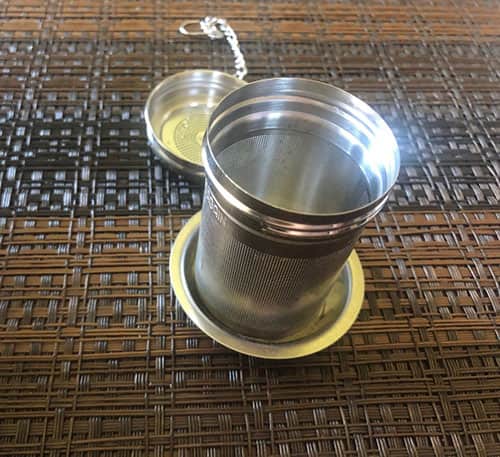
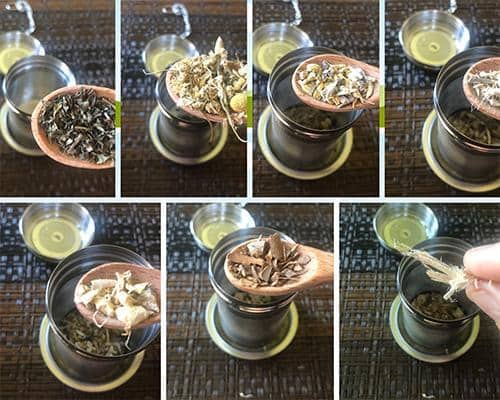
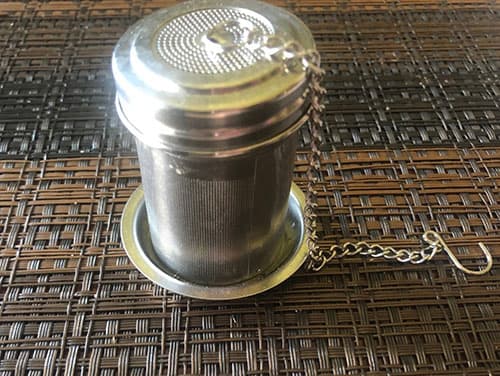
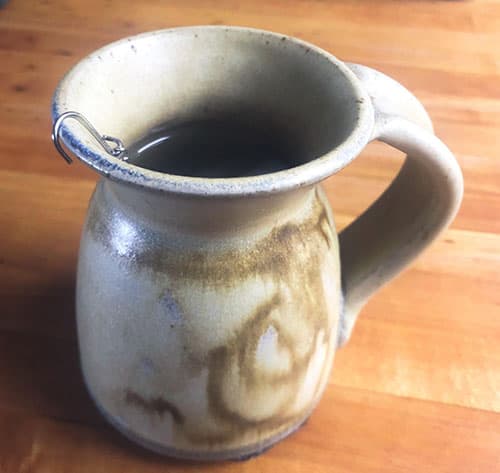
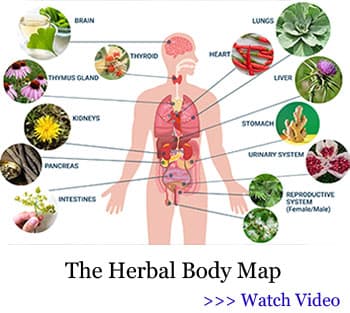
Good tea and its purpose. Thank you!
Hello Jorge,
Thank you for your kind words! We are glad to hear you like this recipe.
Many blessings and good health!
I am a certified master gardener volunteer in Morgan County, WV. I help with writing the monthly newsletter, specifically news and science worthy gardening information. In the past, I could cut and paste links to the articles into the newsletter. I can no longer do this. I am very disappointed, because you have wonderful information that is not easily found. Our master gardeners can also learn about your book and buy it, which I have done. They can also subscribe to your e-mails. Is there something I am missing on my end as to why I am unable to cut and paste the links to your articles? Your assistance is greatly appreciated.
I open the link in a Google Chrome browser and it allows me to copy and paste.
Hello Karyon,
Thank you so much for supporting our work.
We suggest trying again via a different web browser, or use Copy + Paste, instead of Cut.
Many blessings and good health!
Can someone tell me where you purchase all these fresh/dried herbs, plants, and seeds? I don’t have garden space and don’t live with an apothecary and I’m assuming not everyone else does either. I’d love some trusted online sources to purchase from. Thanks!
Mountain Rose Herbs
Hello Cyndi,
Thank you so much for your interest in medicinal plants and herbal remedies.
You can find herbs online on Amazon, Etsy, and many health stores. It is best to use Google to find one that delivers to your area.
Many blessings and good health!
Any way to make a large amount of this ? I know I can just increase the amounts, but how much of the large batch to use per cup?
I have gut issues, and want to try this on a daily basis, but using such small amounts is time consuming. If I could just make a large batch and use it that way it would be a lot easier. Thank you!
I just bought a # each of all the ingredients so I’m all set! (From Mountain Rose Herbs, my go-to for herbs)
Oh, for those of you who are going to try this, please taste before adding ANY sweetener. Licorice root is VERY SWEET, and should be enough …
I would suggest weighing the small porting on a scale before making a larger batch and do it that way.
Can these herbs be tinctured instead of made into a tea?